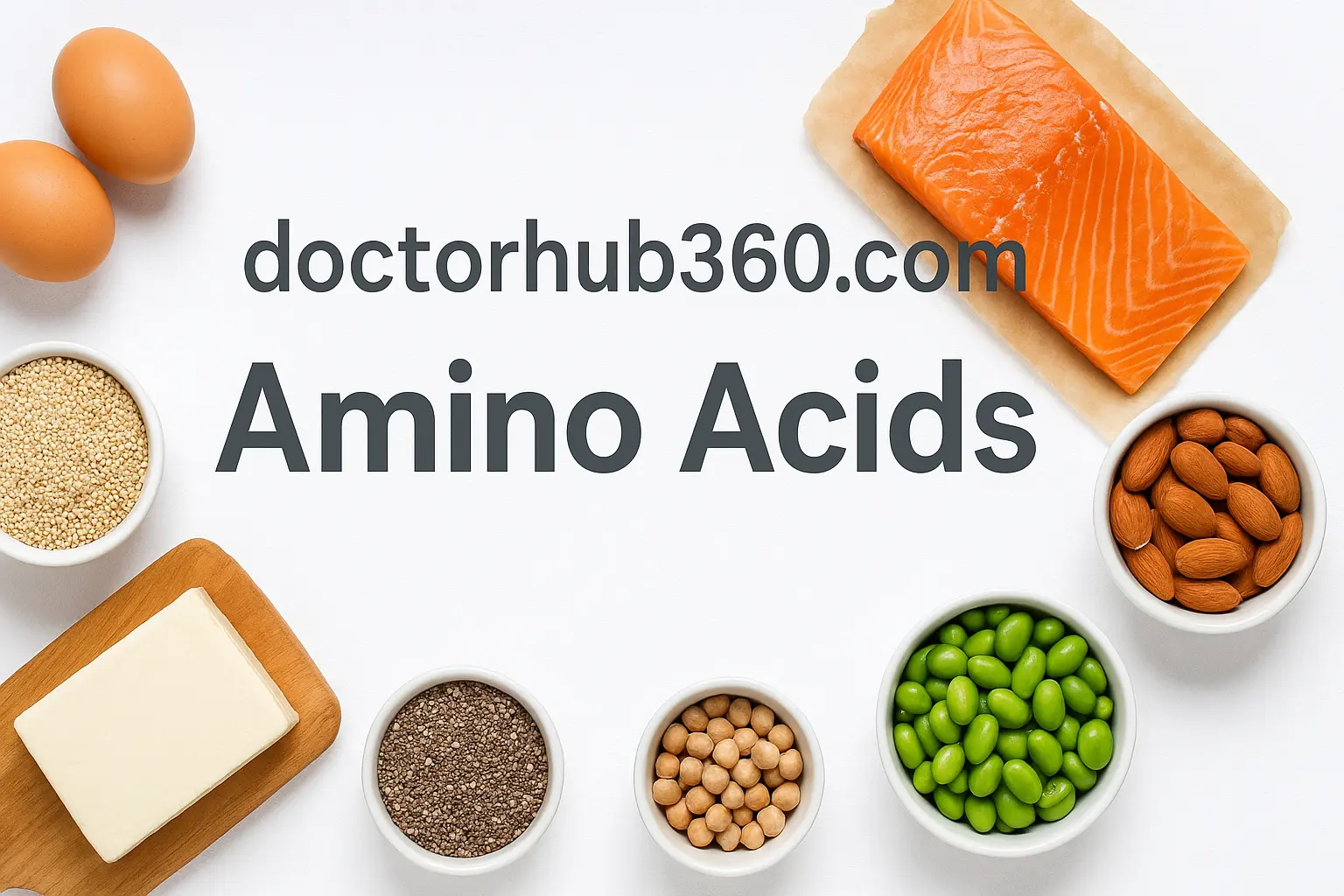Amino acids are the essential building blocks of life, playing a vital role in almost every function of the human body. From muscle growth to energy production, they are involved in numerous biological processes that keep us healthy and active. At doctorhub360.com amino acids, you’ll find detailed information about different types of amino acids, their benefits, natural sources, and how they impact overall well-being. Understanding these nutrients can help you make informed choices about your diet, fitness, and lifestyle.
What Are Amino Acids?
Amino acids are organic compounds that combine to form proteins, which are essential for body structure, hormones, enzymes, and immune system functions. There are 20 amino acids in total, categorized into three main groups:
- Essential amino acids – Cannot be produced by the body and must be obtained through diet.
- Non-essential amino acids – Produced naturally by the body.
- Conditional amino acids – Required during illness, stress, or recovery.
By exploring doctorhub360.com amino acids, you can better understand how these molecules support overall health and the role they play in daily nutrition.
Types of Amino Acids and Their Functions
Essential Amino Acids
There are nine essential amino acids that must come from food sources. They support muscle growth, energy production, tissue repair, and brain health. Rich sources include eggs, fish, chicken, soy, quinoa, and dairy products.
Non-Essential Amino Acids
These amino acids are naturally synthesized by the body. Examples include alanine, asparagine, and glutamic acid, which help regulate energy levels and maintain a strong immune system.
Conditional Amino Acids
During times of stress, illness, or intense exercise, the body needs extra conditional amino acids like glutamine, arginine, and tyrosine. These compounds play a significant role in recovery and boosting immunity.
For an in-depth understanding, doctorhub360.com amino acids provides comprehensive insights into these categories and their importance.
Health Benefits of Amino Acids
Amino acids contribute to a wide range of health benefits, making them crucial for overall wellness:
- Muscle Development & Repair: They help in building lean muscle mass and repairing tissues after exercise.
- Boosting Energy Levels: Amino acids enhance stamina and reduce fatigue during workouts.
- Supporting Brain Function: They influence neurotransmitter production, improving focus and memory.
- Strengthening the Immune System: Amino acids help produce antibodies and white blood cells.
- Improving Skin, Hair & Nails: Collagen production depends on specific amino acids like glycine and proline.
By following guides on doctorhub360.com amino acids, you can learn how to incorporate the right foods and supplements into your daily routine.
Best Food Sources of Amino Acids
To maintain a balanced diet, it’s important to include protein-rich foods containing essential amino acids. Some excellent sources include:
- Animal-Based Sources: Eggs, chicken, beef, fish, and dairy products.
- Plant-Based Sources: Soy, lentils, chickpeas, quinoa, chia seeds, and tofu.
- Combination Diets: Pairing foods like rice and beans can create complete protein profiles for vegetarians and vegans.
doctorhub360.com amino acids also highlights plant-based options for those following vegetarian or vegan diets, ensuring nutritional balance without compromising health.
Amino Acids and Fitness Performance
For athletes, gym enthusiasts, and active individuals, amino acids play a key role in improving endurance and performance. Branched-chain amino acids (BCAAs) like leucine, isoleucine, and valine are particularly beneficial:
- Reduce muscle soreness after workouts
- Enhance recovery speed
- Prevent muscle breakdown during intense exercise
Fitness professionals often refer to doctorhub360.com amino acids for practical insights into choosing the right supplements and planning nutrition strategies.
Amino Acid Supplements: Do You Need Them?
While most people can get enough amino acids through a balanced diet, supplements can be helpful in specific situations:
- For Athletes: To enhance strength and endurance.
- For Seniors: To maintain muscle mass and support mobility.
- For Recovery: After surgery or illness to speed up healing.
- For Vegans & Vegetarians: To ensure they meet their protein needs.
However, before using any supplements, it’s best to understand the recommended dosage and potential side effects. The guides on doctorhub360.com amino acids provide evidence-based recommendations to help you make safe choices.
Amino Acids and Mental Health
Amino acids influence the production of brain chemicals that regulate mood, focus, and sleep patterns. For example:
- Tryptophan helps produce serotonin, improving mood and relaxation.
- Tyrosine supports dopamine production, enhancing focus and motivation.
- Glutamine helps balance neurotransmitter activity, reducing stress levels.
According to experts featured on doctorhub360.com amino acids, including the right sources in your diet can promote better mental and emotional well-being.
Conclusion
Amino acids are vital for maintaining a healthy body and mind. From building muscle and boosting immunity to improving brain function and overall energy, they support nearly every aspect of human health. With guidance from doctorhub360.com amino acids, you can make informed choices about your nutrition, fitness, and lifestyle. A well-balanced diet rich in amino acids ensures long-term wellness and improved quality of life.
FAQs
What are amino acids and why are they important?
Amino acids are the building blocks of proteins and play a key role in muscle growth, energy production, and overall health.
How many amino acids does the human body need?
The body needs 20 amino acids, including nine essential ones that must be obtained from food sources.
Can I get enough amino acids from a plant-based diet?
Yes, by combining foods like beans, lentils, quinoa, and soy, you can meet your amino acid needs as a vegetarian or vegan.
Do amino acid supplements improve fitness performance?
For athletes and active individuals, supplements can aid muscle recovery, endurance, and energy, but a balanced diet is still important.
Which foods are the richest in amino acids?
Eggs, chicken, fish, dairy, soy, quinoa, and chia seeds are some of the best sources of essential amino acids.

